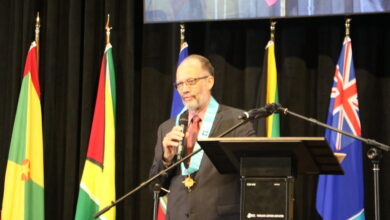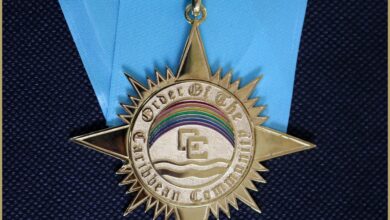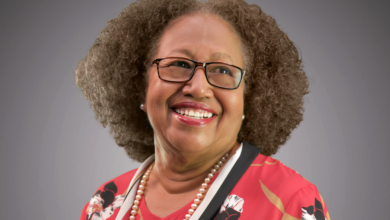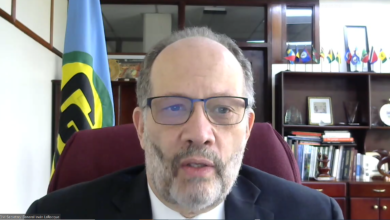On this night, July 3 1973, 40 years ago, a feeling of expectation and spirit of hope filled the Caribbean air.
The Commonwealth Caribbean was poised to make the move from the 1965 free trade area of Dickenson Bay, CARIFTA, to the Community and Common Market of Chaguaramas, CARICOM. The 1973 Georgetown Accord had been transformed into the Treaty of Chaguaramas and a new era of deepened integration was hours away.
That Accord had recognised “that over the past five years the Caribbean Free Trade Association has laid the foundation for further progress in regional integration.” The time was right to build on that foundation as events internal and external were prodding us to ever closer union.
Forty years on we have built on that foundation and have a base upon which we can build a sustainable future. There is also much to celebrate at this milestone in our integration process. We have persevered. We have kept the faith. We have demonstrated clearly the benefits of our co-operation and collaboration. We have responded, time and again to whatever challenges were before us, and used our unity to exercise influence in the global diplomatic arena way above our size.
Having tasted the fruits of CARIFTA such as the Caribbean Development Bank (CDB), the Caribbean Examinations Council (CXC) and the Caribbean Broadcasting Union (CBU), our Leaders, in the words of the preamble of the Georgetown Accord, were encouraged to commit “to ever-widening programmes of functional co-operation and common services.” The signatories were also “convinced that closer economic integration among Member States will contribute to the creation of a viable economic community of the Commonwealth Caribbean Countries.” These determinations to improve the internal dynamics of integration manifested themselves in the new Treaty of Chaguaramas.
Today we can boast of being the longest surviving integration grouping among developing countries and second only to the European Union in global terms. The programmes of functional co-operation and common services have deepened and expanded in health, disaster management, agriculture, the environment and education to name a few.
We have maintained the concept of negotiating as a bloc and have trade agreements as CARICOM with six countries as well as numerous technical co-operation agreements.
In 1989 at Grand Anse, Grenada, we moved to deepen and widen our integration with a Declaration that trumpeted the CARICOM Single Market and Economy as the way forward. The Leaders of the day “inspired by the spirit of cooperation and solidarity among us are moved by the need to work expeditiously together to deepen the integration process and strengthen the Caribbean Community in all of its dimensions to respond to the challenges and opportunities presented by the changes in the global economy.” They triggered events the results of which resonate to this day.
Crucially at that time, as well, Europe was moving towards a Single Market in 1992 with implications for continued preferential access for Caribbean commodities to the United Kingdom market.
Today with the introduction of the CARICOM Single Market in 2006, intra-regional trade has grown from approximately US$600 million in 1990 to more than US$3 billion in 2012 moving from 10 per cent of total trade to 15 per cent. Research has shown that this trade can be doubled if we address certain constraints. We need to harmonise our procedures and provide greater certainty to the trade regime. This is critical, for example, to trade in agriculture including agro-processing.
Madame Chair, Heads of Government, Ladies and Gentlemen, since 1989 we have also widened the movement to include Suriname and Haiti as well as our five Associate Members, Anguilla, Bermuda, British Virgin Islands, Cayman Islands and Turks and Caicos Islands.
In 2001 we signed the Revised Treaty of Chaguaramas after years of negotiation creating new rights and obligations and expanding the scope of our integration. Mere months after that signing, the world changed forever with the attacks on the World Trade Centre in New York, that September. Security became the paramount issue across the globe particularly in respect of travel. At that time our Leaders were increasingly concerned about the growing incidence of crime in our Community.
They responded to that challenge. Security was made the fourth pillar of integration and a security architecture was established which proved its worth during the Cricket World Cup 2007 and continues to do so.
Further, to give certainty to the interpretation of the provisions of the Revised Treaty, the Caribbean Court of Justice has been established as the court with exclusive and compulsory treaty jurisdiction. It also has been embraced as the Final Court of Appeal by three Member States thus far. There are positive signals that soon we may welcome at least two more countries to the Appellate Jurisdiction of the Court.
As we celebrate 40 Years of Integration under the theme, Celebration and Renewal, it is clear from what I have outlined above that we have a lot to celebrate as substantial progress has been made in our integration movement. However, we are also certain that more could have been done and we are all aware of the shortcomings that we must address. In full recognition of this, the Community is involved in a reform process to ensure that our arrangements are relevant and can deliver even more tangible benefits going forward. Within the context of an ever evolving world, it is mandatory that we reflect on our course to keep ahead of the game. Yesterday’s solutions may not always resolve today’s challenges.
This reform process encompasses every facet of our operations including the manner in which we conduct our affairs at every level and a review of all our institutions. The review of the CARICOM Secretariat is under way and the change facilitation team has been working at the Secretariat under my direction. A key element of this process is a five year strategic plan for the Community, the first in its existence.
Relevance, efficiency, effectiveness, flexibility, responsiveness, innovation and creativity, all aimed at providing improved service to our people, is the goal of this reform process. The people centred approach to development is the driver of the change that we are striving to provide. It is at the heart of our integration arrangements and our agenda item at this meeting on treatment of persons with disabilities demonstrates our continued concern at the highest level for the welfare of our citizens.
Further, yesterday here in Port of Spain the Caribbean Public Health Agency was launched. This Agency is a fine example of the melding of our goals – people centred and streamlining our operations. CARPHA is the merger of five regional health institutions into one Agency to provide a better service for our citizens in this important aspect of their lives.
Madame Chair for us to realise our goal of change, we should consider the ideas of our young people. I had the pleasure last Sunday of being part of a twitter relay organised by our CARICOM Youth Ambassadors who are celebrating their 20th Anniversary this year. That internet based discussion was viewed by almost 74,000 people across the Region and further afield, and in it, the Youth expressed their views on where the Community should go.
Their vision was of a Community in which they could move freely, interacting and seeking opportunities; a Community in which they had a role in the decision-making process; a Community in which there would be no need for them to migrate to earn a decent livelihood. They also recognised their role in promoting integration and pledged to be torch bearers in their countries.
Our youth are telling us that they want a Caribbean Community in their future. They want to push the boundaries beyond where we have carried it. They do not foresee a future without CARICOM. For those who question the relevance of CARICOM, I say: where would we be as a people; where would our youth be, if there were no Caribbean Community? A group of disparate countries each seeking to make its own way in a world incredibly hostile to small and micro states. Integration of the Caribbean Community is no esoteric ideal but a hard headed reality. The same reality that drove the founding fathers to sign that Treaty forty years ago continues to impel us. Madame Chair, other Heads of Government, ladies and gentlemen, in welcoming all to this 34th Meeting of the Conference of Heads of Government of the Caribbean Community, I must greet especially the Prime Minister of The Bahamas, Rt Hon Perry Christie; Barbados, Honourable Freundel Stuart; and Grenada, Dr the Rt Honourable Keith Mitchell; who will be addressing us this evening following their victory at the polls.
For the last six months, our Community has been under the stewardship of His Excellency Michel Martelly, President of Haiti. Mr President, I want to thank you for your dedication to the task during Haiti’s first turn in the Chair of the Community.
I cannot close without thanking the government and people of Trinidad and Tobago for their generous hospitality and the excellent arrangements that have been put in place for this Meeting as we return to the birthplace of the Community for a celebration and renewal of our integration movement.
I thank you.




